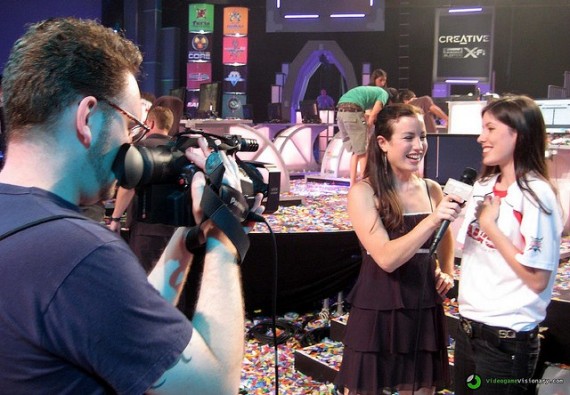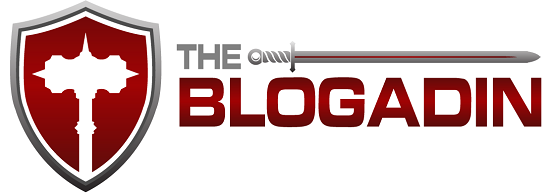Women aren’t e-Sporting (and that might be okay)

Sarah Harrison of the Birmingham Salvo interviewed after winning the World Gaming Championship. Image by VideogameVisionary.com https://www.flickr.com/photos/vgvisionary/ Used under CC License 2.0
A couple days ago the inter-world caught wind of an e-Sports tournament in Finland sanctioned by the South Korean-based IeSF limiting registration to either males or females for specific games (apparently only Starcraft 2 was deemed fit for both sexes). Phil Savage at PCGamer.com brought the knowledge to us, which was then followed by an appropriately high amount of mind-’sploding, weeping, and gnashing of teeth within the gamer community.
The story broke while I was at my day job, but Wil Wheaton nicely encapsulated my general feelings in a blog post so I didn’t have to – thanks, Wil!
(Fair warning: You might want to avoid reading the comments that follow Wil’s post, as they contain widely varying degrees of intelligence and douchery, some of which may make you lose faith in the human race.)
As could have been easily scripted, the IeSF quickly reversed their tune (with Savage again bringing us the the update) and changed the men’s division to an Open to All competition while retaining the women’s division. This is much more in line with most of the professional sports and largely appeased not just the masses, but big Blizzard as well. Blizzard was none too pleased with the original direction of the IeSF once they were informed of women being restricted from playing Hearthstone, and was actually going to restrict IeSF from using their products in competitions that didn’t support and promote inclusion.
So, to recap…
- An organization did something colossally stupid
- People with brains raged against the stupidity
- An organization relented and repented from its stupidity
Or did it? Savage seems to think that IeSF didn’t go far enough, stating, “women are still under-represented in e-sports. A separate competition is an inelegant solution to a very real problem”. It is this opinion that I find most curious.
“A Very Real Problem”
The IeSF sums up the presumed issue in their statement abolishing male-only tournaments:
The IeSF Board addressed its reason for maintaining events for women, citing the importance of providing female gamers with ample opportunities to compete in e-Sports—currently a male-dominated industry. Female gamers make up half of the world’s gaming population, but only a small percentage of e-Sports competitors are women.
The thing is, I’m not sure under-representation is actually a problem, or even a thing in this case. According to the IeSF, women make up roughly half of the gaming public. This is fantastic and certainly not problematic. What both the IeSF and Savage are assuming, however, is that a proportional amount of female gamers also want to participate in e-Sports, but are choosing not to. If that’s the case, then the problem isn’t under-representation but rather the reasons for it. Do women not know about the competitions? Do they feel uncomfortable participating for some reason? Are they being harassed during competitions? These would be the real problems if they existed (and they very well might), not the dearth itself of female competitors.
The other possibility, while doubtful, is that there are no barriers to competition, and women simply don’t desire to formally compete. If that’s the case, that’s not a problem – not for the women, at least. It would simply a preference and a choice, and mean that women are women are appropriately represented.
I suspect the culprit of the lack of lady-folk in e-Sports is likely a combination of perceived external barriers and personal preferences. Either way, under-representation is either a symptom or a myth. Whether they realized it or not, the very real problem that IeSF’s about-face actually addressed was lack of equal opportunity.
Well, that, and preventing Blizzard from taking their ball and going home (which would have been completely appropriate).
“An Inelegant Solution”
So now, instead of separate competitions in Starcraft 2 and wholly different competitions in other games, all games have an open championship AND women get to participate in ladies-only tournaments if they so choose. Not only does this mirror many other professional competitive organizations (see: World Chess Federation, the National Basketball Association, et. al.), but it absolutely helps to equal the opportunities – in fact, it goes overboard in the sense that now women have more opportunity than men to compete! Is it elegant? I would argue so. Is it a solution? Probably only a partial one. It is likely there are other reasons women aren’t competing in e-Sports besides personal preference or simply not being allowed. Data on these perceived barriers to competition must be collected, analyzed and actioned. Only then would it be a solution, and if the IeSF has any further sense left in it at all, it will endeavor to do exactly that. An inelegant solution? More like an elegant reaction.
It’s not a stretch to say that more women want to compete in e-Sports than currently do, nor is it a stretch to say that some of the men in e-Sports are chauvinistic or antagonistic towards women. If you love e-Sports, then, it’s better to help the IeSF address these actual issues that remain rather than be critical of their appropriate step in the right direction.
